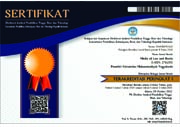Majlis As-Shura and the Plurality Principle: Non-Muslims' Representation in the Majlis As-Shura
DOI:
https://doi.org/10.18196/mls.v4i3.35Keywords:
Islamic law, majlis as-shura, non muslim, pluralityAbstract
As-Shura is the research of the opinions in the community, which is represented by competent persons who will give their views and ideas on a given question, a problem, or even a decision that is very important and is attached to the social, economic, or political life of the people. Therefore, some scholars argued that the elected Shüra must consist of a plurality of political parties, including non-Muslims, who have the authority to formulate the laws of the country. Thus, this research aims to study the main discourses of writers and Muslim researchers on the possibility of this plurality in the Majlis as-Shura in an Islamic state and if that could be going against the morale of a tradition of the law of God that we desperately want to implement and apply. Therefore, the study aims to discourse what competencies the Majlis Al-Shura must have. The research was analyzed using the content analysis method related to documents on Islamic law. The article explored the discussion about Majlis al-Shura from an Islamic perspective by relating The arguments of scholars who support the idea that Majlis al-Shura could have a plurality, which is also one of the values of the democratic system, The article supports the idea that non-Muslims could take part in the shura of the Muslim council, but its authority is restricted and should not be directly linked to the thorough legislation and divine law of the Sharia.
References
"Promoting Shariah Governance in Corporation: Special Reference to Shura" Zuhairah Ariff Abd Ghadas Universiti Sultan Zainal Abidin Terengganu, Malaysia, (December 2016)
"Political Islam and the Right of Peoples to Self-Determination" Iznider, Kamal, The Algerian Encyclopedia of Political and Strategic Studies,( September 26, 2020.)
Nidzham Al-Shura Fi Al-Islam" Dr. Mahmud Al-Khalidi,Oman, Jordan: Maktabah Al-Risalah Al-Hadithah' (1986)
"The imams of the four schools of thought and the caliphs ... anxious relations that left their impact on Islamic political jurisprudence" (Wednesday 7 August 2019) Reseel22.net.
"Decline and Advancement.. Reflections on the Arab Reality” Al-Nakou’, Mahmoud Muhammad (London, 1, 1416 AH / 1996 AD)
“Partisan Pluralism in Islamic Thought, Rooting, Patterns, and Transformation” Al-Milad, Zaki (Beirut, The Kalima Quarterly, The Kalima Forum for Studies and Research, Year 1, No. 2, 1414 AH / 1994 AD).
"Legislative, executive and judicial. Relations between the three powers" Caroline Sägesser "In Dossiers du CRIS" (2016/2)
"The Shari'a and the nation state" ,Knut, S. Vikør.
"˘asan al-Turbı: ara-uhu wa-ijtihduhu fı ’l-fikr wa’l-siysa",turãbi , (London 1996),
"Algeria Parses Islamists" Mustafa al-Ahnaf, Bernard Botiveau, Franck Frégosi .( Paris 1991),
"The participation of non-Muslims in the shura and its institutions in the Islamic state" Dandan jabr. (2014)http://www.odabasham.net.
"Islam and Dhimma" . Dr. Muhammad Al-Zuhaili. "Royal Academy for Research on Islamic Civilization - Aal al-Bayt Foundation - Treatment of Non-Muslims in Islam Series" - (Amman - 1989)
"Interpretation of Al-Manar" Muhammad Rashid Rida. (vol. 5)
"The Principle of Equality in Islam" Dr. Fouad Abdel Moneim Ahmed
Downloads
Published
How to Cite
Issue
Section
License
Copyright (c) 2023 Kante Hamed

This work is licensed under a Creative Commons Attribution 4.0 International License.

